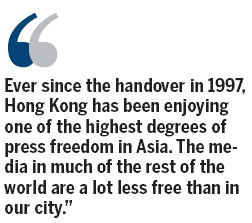Press freedom remains intact and cherished in Hong Kong
Updated: 2014-01-24 05:50
By Bob Lee(HK Edition)
|
|||||||
The Legislative Council debated a motion on "safeguarding editorial independence and autonomy" tabled by one of the opposition lawmakers on Wednesday. Press freedom is an important factor behind Hong Kong's many successes, so it is appropriate that the central government and the SAR government uphold this core value, cherished by Hong Kong people. In this regard, the issue deliberately brought about by some opposition members is actually a pseudo-proposition.
The motion stated "a recent opinion poll indicates that more than half the respondents consider that the phenomenon of self-censorship exists among Hong Kong news media", hinting that Beijing, by using its leverage, has been trying to intimidate and silence journalists who write stories which might upset the central government and put pressure on media owners and advertisers. Some political pundits went further to argue that gradual "mainlandization" contributes to eroding media credibility and the squeezing of press freedom in the city.
Three examples cited by the opposition camp are: State-owned conglomerates are known to exert influence through advertising revenue on editorials; the most recent case is ICBC - the largest bank of the country - which allegedly withdrew advertisements from am730, an outspoken free tabloid; Standard Chartered Bank stopped advertising in Apple Daily; Ming Pao, once known as a highly independent newspaper, said its chief editor had been removed.
But all clear-minded citizens can easily see the above mentioned accusations are nothing more than pure guessing. They are unfounded and groundless. So far, no concrete instances can be produced to support the verdict that the central government meddles with local media organizations' editorial independence. In fact, one spokesman from a local bank quickly answered that withdrawing the company's ad was purely a commercial decision.
It is especially worth noting that, the real truth is quite the opposite from the opposition's version. Ever since the handover in 1997, Hong Kong has been enjoying one of the highest degrees of press freedom in Asia. The media in much of the rest of the world are a lot less free than in our city. For example, during the Occupy Wall Street campaign in the United States, journalists were detained and kept in police vans to stop them reporting. The police also manhandled protesters, beating them and using pepper spray at close range. But here in Hong Kong, throughout all last year, demonstrators could be seen gathering around the LegCo building, the government complex and Victoria Park, or marching through Causeway Bay, Wan Chai and Admiralty. No one could see the heavy-handed policing frequently seen in the West.

Hong Kong's high level of press freedom is universally admired and recognized by Reporters Without Borders. First, from legal point of view, the city's freedom of speech, of the press, and of publication is enshrined in Article 27 of the Basic Law. It is also protected by the International Covenant in Civil and Political Rights (ICCPR) under Article 39 of the Basic Law.
Second, from the regulatory point of view, Hong Kong is actually a haven for the media; there is no government regulatory body which controls newspapers in Hong Kong or exercises direct influence over the media. With loose regulation over the establishment of print media, the city has virtually the largest number of newspapers in the world in regard to the small size of its population.
Third, all "touchy issues" are dynamically discussed by the media. Many mainstream media outlets still boast about "credibility" as their strength and as a marketing tool to attract audiences and advertisers.
The opposition camp currently plays up this pseudo-proposition for a reason: With universal suffrage solemnly promised by the central government fast approaching, they desperately need to occupy the moral high ground. Agenda-setting - "wake up, our press freedom is in jeopardy" - sounds like a handy trick. Nevertheless, a reality check shows it is merely a case of barking up the wrong tree. Our fellow citizens should take a step back and realize that these politicians try to sway public opinion by inciting discontent for political gain.
The author is a current affairs commentator.
(HK Edition 01/24/2014 page9)